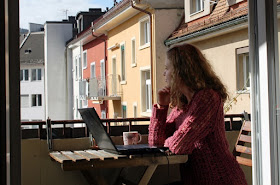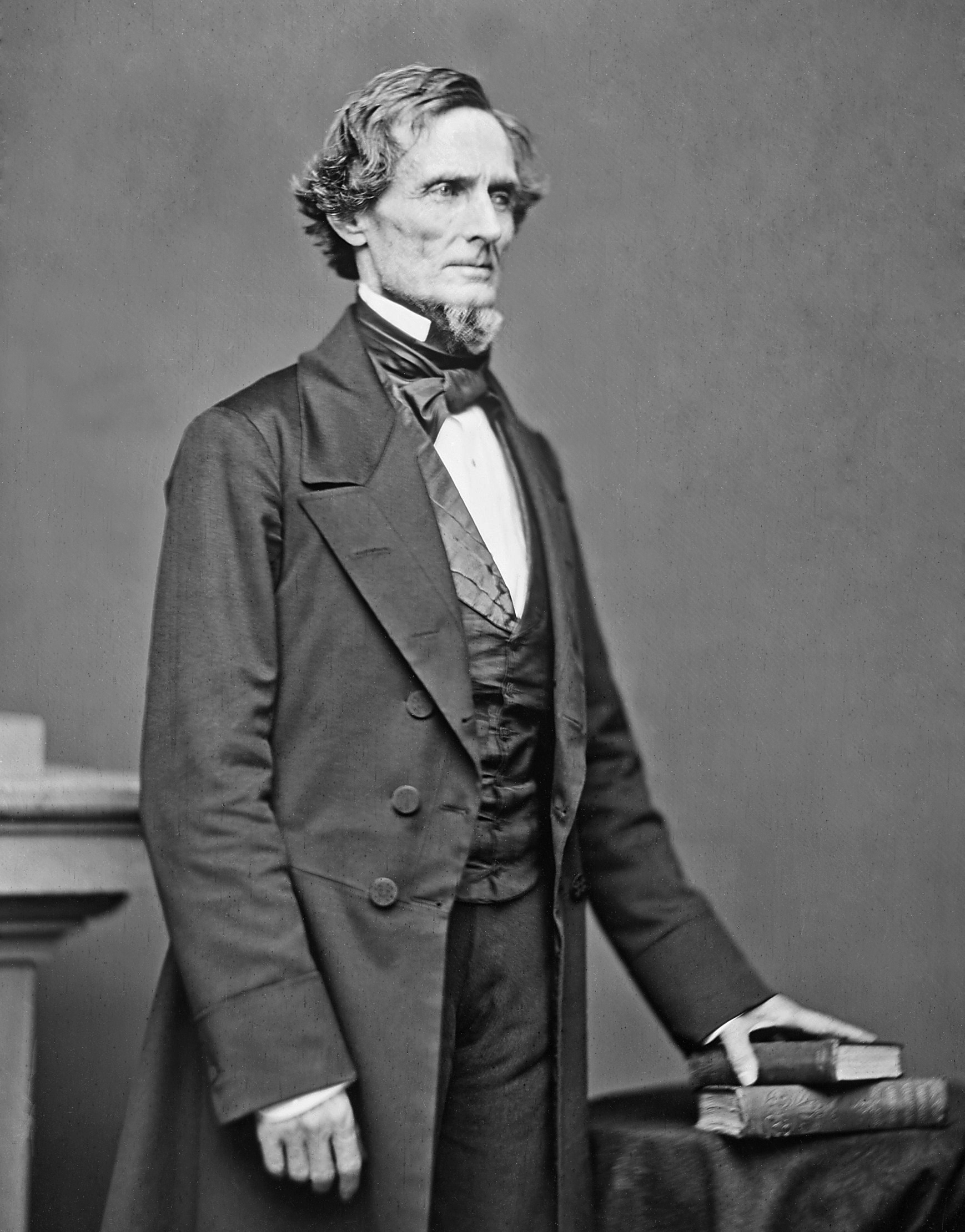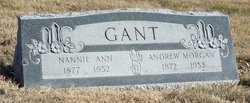Andrew Morgan Gant - our 2nd cousin twice removed - was born on March 10, 1872, in Sumner County, Tennessee. He was the fifth child (the third son) of James Abram Gant and Soviah Elizabeth Rippy.
In 1880 the family still lived in Tennessee at District 12, Sumner County (Census records)*.
Mr. James Abram Gant was a farmer. The Census paper from the 1880 year informs also that other Gant family members lived in the same area, very close to his farm. It was his three years younger brother William Henry with 36-year-old wife
Malinda Frances nee Cline and their children Anne Laura (9), Alonzo Wilson (7) and Herman Franklin (5). Then, the third Gant's farm at District 12 was the one run by Andrew's 22-year-old cousin Joseph Mansfield Gant (son of Jonathan Kerr Gant - James Abram's brother) and his 17-year-old wife Cynthia Henrietta nee Anglea.
A bit farther from Andrew's family's farm, but still at the same 12th District, there were two farms which belonged to two relations as well.
#1 was the farm of Mr. Andrew Jackson Cline (born in 1806) who was
Malinda's father. In 1880, he lived there with his wife Mary Cynthia nee Fykes (born in 1815).
Farm # 2 was the one run by Malinda's cousin John William Cline (b. 1838 in TN). His wife was Louisa Elizabeth "Lucy" Riggs. In 1880, they lived on the farm with their 10 children.
What is even more interesting, other families and surnames mentioned on the above page of the 1880 Census records, were also keens of Andrew Morgan Gant's. John W. T. Mattox was related to the Gant family through intermarriages of the Mattox, Gant, and Perdue people. John's wife R. Sophia nee Fykes was not a stranger in the family either. The Fykes surname appears in the family tree - they were related to the Clines. Just to remind you that Malinda Frances Cline was married to Andrew Morgan's father's brother. Anyway, R. Sophia Mattox died in 1885, five years after that Census.
There is more. Family #121 listed on the page: Alexander Dallas Braswell, his wife Elvira Isabell and their six children. Elvira's maiden name was Cline. She was a sister of Malinda Frances. And it is not all! Family #122: John I J Charlton (54), wife Amanda M (48) nee Satterfield, their five children and Amanda's mother Dorcas Satterfield born Thacker (74). The Charltons were related to the Gants and Clines via marriages with the Anglea and the Rippy families. I think it's amazing that they all lived close to each other.
According to the family notes, the closest relations most likely called Andrew Morgan Gant by his middle name as this is how the picture of him was labeled.
The last event in Morgan's immediate family which happened and was recorded in Tennessee was the marriage of his brother Louicillious Lee Gant and Miss Johnetta Isabella Anderson. The ceremony took place in Sumner County, TN on August 26, 1889. Johnetta's parents were Mr. John Austin Anderson and Ms. Sarah Austin.
Morgan's other siblings and parents very likely moved to Texas by 1886 as Martha Alice Gant, Morgan's sister, married Mr. John Edward Dupree in 1890, in Plano, Collin County, Texas. Maybe Morgan stayed in TN with Louicillious and his wife? The first three children of the Loucillious Gants' were born in Tennessee. The fourth one, Gracie, was born in Texas on December 3, 1890. It seems, that by then, they all must have joined the rest of the family who had already lived in Texas.
Anyway, according to my research, Andrew Morgan Gant got married in 1891 in Tennessee. The girl she married was Miss Nannie Ann Gunter, born on April 19, 1877, in Frankenwing Co., TN. If my finds are correct, she was about 14 then (she was 5 years younger than her spouse). Nannie's parents were William Jackson Gunter and Loretta F McCrackin.
In 1891, there was another marriage in the Gant family. Morgan's sister Mary Emma tied the knot with Mr. W. R. Hart of Kentucky. It was on December 16, 1891, in Collin County, TX.
Morgan and Nannie's first child,
Claude was born in Plano, Texas on September 2, 1892. Unfortunately, the boy lived about a month only - he died on October 23, 1892. Two years later, the young couple mourned their daughter
Teenie who was born on March 7, 1894 (in Plano as well) and left this world on March 24, 1894.
A year later, on August 23, 1895, the second daughter was welcomed to the family. Her name was
Georgia Lue.
Very sadly, the fourth child and the second son of Morgan and Nannie's,
Oliver Jack, did not survive either. He was born on January 7, 1898, and he lived only 5 months - he passed on June 6, 1898.
In the very same year, there was a happier event in the family - Morgan's younger brother Sidney William (born on Nov. 26, 1876, in TN) married Miss Mollie Ann Massey (born on July 24, 1881, in Macon, Bibb Co., GA). Mollie was a daughter of Hugh Elbert Massey and Arminta Irna Hogan (nee Wilson).
In 1900 another Census** was carried out. At that time, Andrew Morgan and Nannie lived at Justice Precinct 5 (west part) Plano town, Collin, Texas.
The records say that Morgan was a farmer, he rented a farm which was situated close to his father's farm. Studying the information included on the Census page, we can also find out that Morgan's mother Soviah was illiterate.
In 1900, some family members, the Gants' relatives, were recorded in the same Plano area as well. There was Capt. James Kennon Aldridge (born in TN in 1829), his wife Mariah Letitia nee Lively (born in 1843 in KY) and their children. John Kennon's son Joel Lively (born in 1864, in Plano, TX) his wife Lizzie nee Dye (born in 1873 in Plano too) and their 8-year-old daughter Fannie were listed in the Census then as well. Other surnames which we can find on the very same page of the 1900 records and also appear in the family tree are: Fykes, Brent and Rice. However, so far I have not found the connection of those particular individuals to Morgan's family branch.
Around 1900, there was a marriage in the family. Andrew Morgan's youngest brother Walter Orlando was the groom. According to the records, he was the only one who stayed in Tennessee. Maybe because his bride Hattie Jane Anglea was from there as well. Actually, she was the two brothers' distant cousin.
Tennessee, County Marriages, 1790-1950
Name: Walter Gant
Event: Type Marriage
Event Date: 23 Nov 1899
Event Place: Sumner, Tennessee, United States
Gender: Male
Spouse's Name: Hattie Anglea
Spouse's Gender: Female
Record Source:
"Tennessee, County Marriages, 1790-1950," database with images, FamilySearch (https://familysearch.org/ark:/61903/1:1:QKH3-C5P9 : 22 December 2016), Walter Gant and Hattie Anglea, 23 Nov 1899; citing Sumner, Tennessee, United States, Marriage, p. , Tennessee State Library and Archives, Nashville and county clerk offices from various counties; FHL microfilm 467,487.
A year later, another daughter was born to Andrew and Nannie. They named her Maud Ruth.
The family was growing. The fourth baby girl came to this world on February 20, 1903. It was little Bessie B.
In the very same year, Andrew Morgan lost his mother Soviah. She passed on December 23, 1903. That year Christmas must have been very sad for the family. Soviah Elizabeth Gant was buried at the Municipal Cemetery in Plano.
About four years later, Andrew and his wife celebrated the birth of their youngest girl
Elsie May.
In 1910***, Morgan, his wife and children still lived at
Justice Precinct 5, Collin, Texas.
The "hired man" was Nannie's brother Jesse Davis (b. Nov. 17, 1887, Texas). Most probably, he worked with Andrew at the farm.
Their closest neighbors were not Morgan's parents. It seems Sidney William and his wife Mollie had taken over the farm which previously belonged to Sidney and Andrew's parents. The young couple and their five children were the closest neighbors of Andrew and Nannie's.
I am not sure where James Abram, Morgan's father, lived in 1910 as I have found no records regarding the man. Maybe he lived with Andrew Morgan and Nannie.
A year after the Census, Andrew Morgan's family had a really happy Christmas Eve. They celebrated the marriage of
Georgia Lue's. Her spouse was Greenberry Mayes born on April 28, 1888, in Morristown, Hamblen, Tennessee. Georgia's in-laws were Andrew Johnson Mayes and Susan Marinda Mathes of Tennessee.
Texas Marriages, 1837-1973
Name: G. B. Mayes
Spouse's Name: Georgia Gant
Event Date: 24 Dec 1911
Event Place: Collin, Texas
Record Source:
"Texas Marriages, 1837-1973," database, FamilySearch (https://familysearch.org/ark:/61903/1:1:FXSS-VM1 : 11 February 2018), G. B. Mayes and Georgia Gant, 24 Dec 1911; citing Collin, Texas, , reference p 344 cn 214; FHL microfilm 1,289,603.
Georgia and Greenberry had five children: Nannie Sue (b. Sept. 1912, in Plano - d. March 30, 1913), Helen Ruth (b. Oct. 1, 1913 - d. Feb. 18, 1999), Frederick Ray (b. Nov. 15, 1920 in Murphy, Collin, TX - d. March 14, 1995, Plano, Collin Co.), Bessie Mae (b. Feb. 8, 1923 in Murphy - d. Sept. 22, 1992 in Dallas, TX) and James Lynn (b. Dec. 11, 1931 Murphy - d. July 8, 2009 in Frisco, Denton County, TX).
On April 1, 1914, Andrew's father, James Abram Gant left this world. He was buried in Plano, next to his wife Soviah.
Clipping source:
Logsdon, Ernest. The Plano Star-Courier. (Plano, Tex.), Vol. 25, No. 45, Ed. 1 Thursday, April 2, 1914, newspaper, April 2, 1914; Plano, Texas. (https://texashistory.unt.edu/ark:/67531/metapth601735/: accessed June 10, 2019), University of North Texas Libraries, The Portal to Texas History, https://texashistory.unt.edu; crediting Collin County Genealogical Society.
The 1920 Census**** shows that Andrew and Nannie lived with their daughters and Jesse Gunter at
Justice Precinct 5, Collin, Texas.
Andrew and his brother Sidney William were no longer neighbors in 1920. Possibly Andrew + family moved (to Murphy?). We can see that different people lived by their place. On the same page of that Census, there is the name of Andrew's sister's (Orpha K.'s) mother-in-law Delia Adeline Starnes. Delia was widowed in 1904 (her husband was Bishop Ellis Starnes of SC). In 1920, she lived with her 77-year-old mother Mrs. Margaret L Merrit. Another relation who lived close to Andrew Morgan then was Delia's son and Orpha's brother-in-law Thomas Dewey Starnes. His wife Rosa Lee Hooper and a year-old daughter Mary E. were also recorded by Census in 1920.
The youngest daughter of Andrew's,
Elsie May, got married at the age of 18, on March 4, 1925. Her husband was O'Neal B. Hillin.
Texas, County Marriage Records, 1837-1965
Name: Oneal B Hillin
Titles and Terms: Mr
Event Type: Marriage
Event Date: 04 Mar 1925
Event Place: Collin, Texas, United States
Gender: Male
Spouse's Name: Elsie Mae Gant
Spouse's Titles and Terms: Miss
Spouse's Gender: Female
Page 331
Record Source:
"Texas, County Marriage Records, 1837-1965," database with images, FamilySearch (https://familysearch.org/ark:/61903/1:1:K61Y-M9H : accessed 22 March 2018), Oneal B Hillin and Elsie Mae Gant, 04 Mar 1925, Marriage; citing Collin, Texas, United States, various county clerk offices, Texas State Library and Archives Commission, Texas Dept. of State Health Services and Golightly-Payne-Coon Co.; FHL microfilm 2,316,241.
Elsie and Oneal had two children (at least this is what I have found so far) Bobby Oneal (b. 1926) and Nannie E (b. 1935).
Very likely there were three marriages in the family - year after year.
Maud Ruth married Jake Logan Brand of Justice Precinct 3, Dallas, TX (born on August 20, 1901), son of Albert Roscoe Brand and Alabama Elizabeth Sachse's. Maud and Jake had two children Dorothy Sue (b.1927) and Jake Logan Brand Jr. (b. 1939).
Bessie B Gant, another daughter of Andrew's, possibly got married around 1927. Her spouse was Henry Barton Jones (born on Oct. 25, 1901). The couple had three daughters Tommie Lee (b. September 12, 1928, in Murphy - d. Nov. 28, 2013, in Marshall, Harrison County, TX), Bettie Ruth (born Oct. 18, 1936), and Mary Bess (b. on May 20, 1942, in Dallas, Dallas Co., TX).
In 1951, Andrew Morgan's health deteriorated suddenly due to cerebral hemorrhage. He was 79 then. Probably after the stroke, Andrew was (at least) partially disabled/paralyzed.
I do not know who looked after him later. Probably, it was his wife Nannie. It must have been a hit to the wife. I reckon the family tragedy and changed life circumstances were too much of a load to her as she herself had a stroke as well. However, the death certificate states that the reason of that was (untreated?) hypertension. Nannie lived in Murphy then, but she was treated at the City County Hospital in McKinney for two days. Sadly, on October 29, 1952, Nannie Ann passed away. The death certificate was confirmed by Mrs. J L Brand - it was Maude Ruth Brand, Nannie, and Morgan's daughter.
Texas Deths Records
Name: Nannie Ann Gant
Event Type: Death
Event Date: 29 Oct 1952
Event Place: McKinney, Collin, Texas, United States
Gender: Female
Marital: Status Married
Birth Date: 19 Apr 1877
Birthplace: Tennessee
Father's Name: Jack Gunter
Mother's Name: Loretta Mccrackin
Certificate Number: 53248
Record Source:
"Texas Deaths, 1890-1976," database with images, FamilySearch (https://familysearch.org/ark:/61903/1:1:K3ZH-GYR : 13 March 2018), Nannie Ann Gant, 29 Oct 1952; citing certificate number 53248, State Registrar Office, Austin; FHL microfilm 2,113,701.
The family used the service of Harrington Funeral Home represented by Mr. J O Harrington. Nannie Ann Gant was buried at Plano Mutual Cemetery.
It seems that a few months after Nannie's death, her husband was placed in an institution which was in Dallas County (possibly in Dallas) where he stayed for about 8 months till his death. The address of the place given on death certificate was "Royal Lane Rt. 6, Box 332."
Almost a year later, Andrew Morgan's condition got worse - it was pneumonia which was treated for two days with no positive results. Andrew Morgan Gant passed away on August 25, 1953. He lived 81 years, 4 months and 25 days.
Texas Deaths
Name: Andrew Morgan Gant
Event: Type Death
Event Date: 05 Aug 1953
Event Place: Dallas, Texas, United States
Gender: Male
Marital Status: Widowed
Birth Date: 10 Mar 1872
Birthplace: Tennessee
Father's Name: Abram Gant
Mother's Name: Savara Rippy
Certificate Number: 40370
Record Source:
"Texas Deaths, 1890-1976," database with images, FamilySearch (https://familysearch.org/ark:/61903/1:1:K397-N1V : 13 March 2018), Andrew Morgan Gant, 05 Aug 1953; citing certificate number 40370, State Registrar Office, Austin; FHL microfilm 2,113,981.
As it was previously, the family member who confirmed the data on the death certificate was Mrs. J L Brand. And again, Harrington Funeral Home took care of Andrew's burial. He rests with his wife at the cemetery in Plano.
As for Andrew Morgan and Nannie Ann's daughters
Georgia Lue Mayes remarried circa 1973. Her second husband was Mr.
Leffel Gant, a widower - they lived in Dallas. Georgia was treated at a hospital in Dallas for several weeks due to severe health problems. She died on December 28, 1973, and was buried in Plano (the Harrington Funeral Home mentioned above had turned to Harrington-Betcher-Dickey).
Bessie B passed on Sept. 3, 1975, at her home in Murphy, Rt.2 Box 136 Plano, TX.
Record Source:
"Texas Deaths, 1890-1976," database with images, FamilySearch (https://familysearch.org/ark:/61903/1:1:K386-86T : 13 March 2018), Bessie B Jones, 03 Sep 1975; citing certificate number 66373, State Registrar Office, Austin; FHL microfilm 2,243,829.
Maude Ruth died on July 17, 1986, in Dallas, Dallas Co.
Texas Death Index
Name: Maudie Ruth Brand
Gender: Female
Event Date: 17 Jul 1986
County: Dallas
Event Place: Dallas, Texas, United States
Record Source:
"Texas Death Index, 1964-1998," database, FamilySearch (https://familysearch.org/ark:/61903/1:1:JVRB-JT5 : 5 December 2014), Maudie Ruth Brand, Dallas, Texas, United States; citing Department of State Health Services, Austin.
Elsie May died on November 7, 1985, in the city of Dallas, TX.
Texas Deaths
Name: Elsie Mae Hillin
Gender: Female
Event Date: 07 Nov 1985
County: Dallas
Event Place: Dallas, Texas, United States
Record Source:
“Texas Death Index, 1964-1998,” database, FamilySearch (https://familysearch.org/ark:/61903/1:1:JVRN-73K : 5 December 2014), Elsie Mae Hillin, Dallas, Texas, United States; citing Department of State Health Services, Austin.
Credits:
Photos of gravestones: mystic75054
findagrave.com Information and census data: familysearch.org
* "United States Census, 1880," database with images, FamilySearch (https://familysearch.org/ark:/61903/1:1:MDWX-BF8 : 15 July 2017), Sophia E Gant in household of J Abram Gant, District 12, Sumner, Tennessee, United States; citing enumeration district ED 218, sheet 186A, NARA microfilm publication T9 (Washington D.C.: National Archives and Records Administration, n.d.), roll 1282; FHL microfilm 1,255,282.
** "United States Census, 1900," database with images, FamilySearch (https://familysearch.org/ark:/61903/1:1:M3LQ-X57 : accessed 17 January 2018), Sofia E Gant in household of James A Gant, Justice Precinct 5 (west part) Plano town, Collin, Texas, United States; citing enumeration district (ED) 16, sheet 23B, family 453, NARA microfilm publication T623 (Washington, D.C.: National Archives and Records Administration, 1972.); FHL microfilm 1,241,621.
*** "United States Census, 1910," database with images, FamilySearch (https://familysearch.org/ark:/61903/1:1:M2SC-SRF : accessed 17 January 2018), Nannie Gant in household of A M Gant, Justice Precinct 5, Collin, Texas, United States; citing enumeration district (ED) ED 21, sheet 2A, family 27, NARA microfilm publication T624 (Washington D.C.: National Archives and Records Administration, 1982), roll 1540; FHL microfilm 1,375,553.
**** "United States Census, 1920," database with images, FamilySearch (https://familysearch.org/ark:/61903/1:1:MCMS-421 : accessed 17 January 2018), Elsie M Gant in household of A Morgan Gant, Justice Precinct 5, Collin, Texas, United States; citing ED 23, sheet 5A, line 33, family 88, NARA microfilm publication T625 (Washington D.C.: National Archives and Records Administration, 1992), roll 1789; FHL microfilm 1,821,789.












